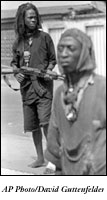Panama: Jail for journalists as government drags heels on gag-law reform
Your Excellency, The Committee to Protect Journalists (CPJ) is concerned about the lack of progress in the reform of Panama’s “gag laws.” Two recent cases in which Panamanian journalists were sentenced to prison for allegedly defaming public officials highlight the urgency of abolishing these unjust statutes without delay.
Belarus: Independent press systematically intimidated
May 25, 2000 His Excellency Alexander Lukashenko President of Belarus Republic Minsk 220020 VIA FAX: 011-375-172-23-58-25 Your Excellency: The Committee to Protect Journalists (CPJ) is deeply disturbed by the continuing pattern of intimidation by federal and local authorities of the independent press in Belarus. Over the past few months, we have monitored many violations of…
TAOUFIK BEN BRIK ENDS 43-DAY HUNGER STRIKE
New York, May 16, 2000 —Tunisian journalist Taoufik Ben Brik, who went 43 days without food to protest government harassment, ended his hunger strike yesterday in Paris, where he has been staying since leaving Tunisia on May 4. Ben Brik had vowed to continue his strike until Tunisian authorities released his brother Jalal Zoughlami, who…
Free to travel but still on hunger strike, Tunisian journalist arrives in France for medical care
Click here to read more about press freedom conditions in TUNISIA. New York, May 5, 2000 — Tunisian authorities lifted a travel ban imposed on journalist Taoufik Ben Brik, who arrived in France yesterday. But Ben Brik vowed to continue his 33-day hunger strike until his brother is freed from government custody, the Committee to…
French press delegation assaulted outside home of beleaguered Tunisian journalist
Click here to read more about press freedom conditions in TUNISIA. New York, April 26, 2000 — Tunisian police assaulted a group of French press freedom advocates and journalists today when they attempted to visit Tunisian journalist Taoufik Ben Brik, who was in the 24th day of a hunger strike to protest two years of…
Journalist Enters 19th Day of Hunger Strike
Click here to read more about press freedom conditions in TUNISIA. Click here to read CPJ and Human Rights Watch’s recent joint protest letter to President Ben Ali: New York, April 21, 2000—Tunisian journalist Taoufik Ben Brik today entered the 19th day of a hunger strike launched on April 3 to protest the Tunisian government’s…

Attacks on the Press 1999: The Trauma of Sierra Leone
Introduction On January 6, 1999, rebel forces entered Freetown and launched a campaign of terror. Revolutionary United Front (RUF) fighters systematically murdered, mutilated, and raped thousands of civilians. During the three weeks that it took for Nigerian-led West African peacekeeping troops to expel the rebels from Freetown, Sierra Leone officially became the most dangerous country…
Attacks on the Press 1999: Croatia
Croatia’s new center-left ruling coalition, elected in parliamentary polls on January 3, 2000, has pledged to improve the country’s dismal press freedom and civil- rights record after a decade of abuses by the nationalist Croatian Democratic Union (HDZ). The newly elected government and president, the latter to be chosen in a runoff presidential poll on…
Attacks on the Press 1999: Democratic Republic of Congo
The civil war that began as a rebel insurgency in August 1998 continued to destabilize the entire region, with Angola, Zimbabwe, and Namibia supporting President Laurent-Désiré Kabila’s government and Rwanda and Uganda fighting on the side of Congolese rebel forces. From the beginning, President Kabila has tended to blame his military setbacks on the local…
Attacks on the Press 1999: India
India’s extraordinary diversity is often seen as its greatest strength, but religious, ethnic, and regional conflicts regularly pose significant challenges to the country’s democracy, and to its press. While the Indian press remains one of the most pluralistic and vibrant in the world, journalists are still vulnerable to attack. And under the leadership of the…